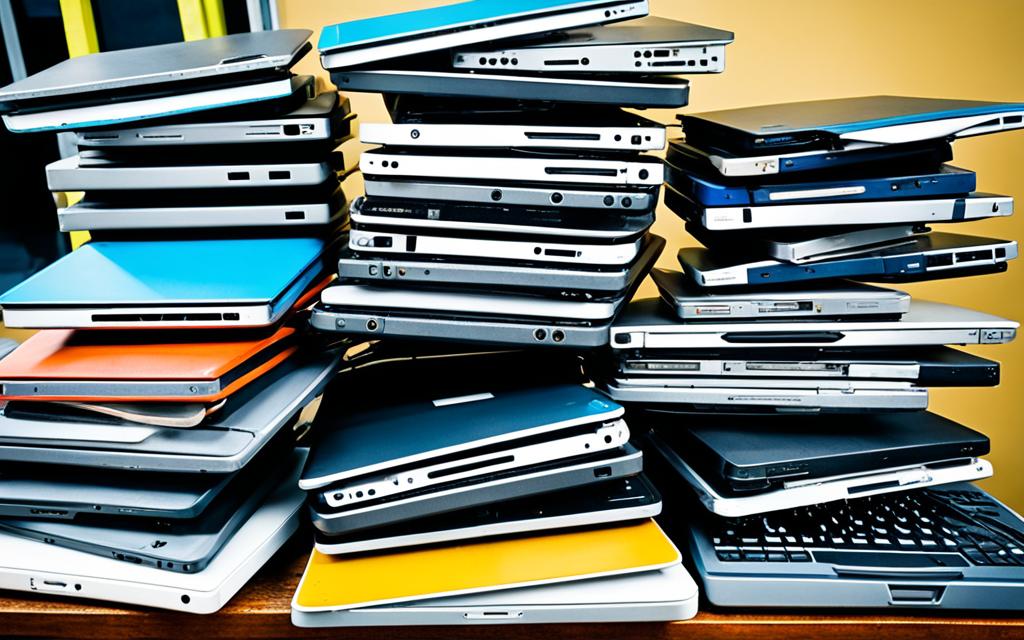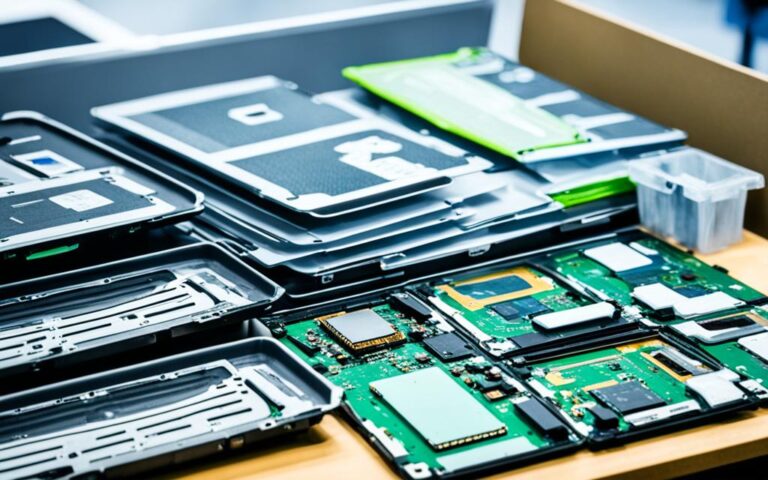The Benefits of Laptop Recycling for Schools and Nonprofits
Educational laptop recycling presents numerous advantages for schools and nonprofits in the United Kingdom. By partaking in laptop recycling initiatives, educational institutions and charitable organizations can not only promote sustainability but also provide access to technology for students and communities in need.
Through partnerships with reputable organizations like Computer Aid, unwanted laptops from corporate businesses and organizations can be refurbished and donated to schools, charities, and communities. By empowering them with the necessary tools, establishments can enhance learning, bridge the digital divide, and foster skill development.
Laptop donations to schools enable institutions to offer greater online support for both teachers and students. These portable and user-friendly devices serve as invaluable tools, enhancing the curriculum and enabling practical skill development. Additionally, programs like Computer Aid accept donated tablets, phones, and computers, ensuring a diverse range of devices can be refurbished and utilized to support educational growth.
Laptop donations to charities also have a significant impact on international communities. By providing refurbished laptops to underserved areas, organizations like Computer Aid enable access to 21st-century technology, helping reduce the global digital divide. From new skills for community leaders to online presence for business owners and up-to-date curriculum for teachers, laptop donations empower individuals and make a positive difference.
Refurbishing computers for educational purposes is crucial for sustainability and promoting environmentally friendly practices. By repairing and reusing laptops, organizations extend their lifespan, reducing electronic waste. With skilled technicians ensuring high-quality standards, non-profit organizations and schools can acquire reliable devices at a fraction of the cost of new ones, enhancing their educational programs while minimizing environmental impact.
Responsible recycling is another vital aspect of laptop recycling. When devices are beyond repair or no longer usable, ethical recycling practices come into play. Through partnerships with reputable recycling companies, organizations like Computer Aid ensure that donated devices are carefully disassembled, and salvageable parts are repurposed. This not only reduces electronic waste and minimizes the need for raw materials but also maximizes resource recovery. The revenue generated from recycling materials contributes to continued funding of programs and positive impact in communities.
In conclusion, educational laptop recycling offers a wide range of benefits for schools, nonprofits, and communities in the United Kingdom. By donating laptops, schools and charities can provide access to technology, enhancing learning and skill development. Repair and reuse practices contribute to sustainability and environmental protection. Responsible recycling ensures that electronic waste is minimized, and valuable resources are recovered. Embracing laptop recycling initiatives enables individuals and organizations to make a positive impact on the environment while promoting accessibility to technology.
Donating Laptops to Schools
When laptops are donated to schools through programs like Computer Aid, it allows them to offer more online support for learning, both for teachers and students. Laptops serve as a portable and user-friendly tool, enabling teachers to enhance their curriculum and students to develop practical skills. Additionally, donated tablets, phones, and computers are also accepted, ensuring that a wide range of devices can be refurbished and utilized to support educational growth in schools.
Benefits of Donating Laptops to Schools
- Enhanced Learning: Donated laptops provide schools with the opportunity to incorporate technology into their teaching methods, allowing for more interactive and engaging lessons. Teachers can create multimedia presentations, access online educational resources, and facilitate collaborative projects.
- Accessibility and Equity: By donating laptops, schools can bridge the digital divide and provide access to technology for all students, regardless of their socioeconomic background. This helps level the playing field and ensures that every student has the opportunity to develop essential digital skills.
- Flexibility and Portability: Laptops are portable and lightweight, allowing students to easily carry them between classes or take them home. This flexibility enables students to continue their learning outside of the classroom and complete assignments wherever they are.
- Increased Teacher Efficiency: With laptops, teachers can streamline administrative tasks, such as grading and lesson planning, saving time and allowing them to focus on providing quality instruction. Laptops also enable teachers to personalize their teaching methods to cater to individual student needs.
- Preparation for the Future: In today’s digital age, proficiency with technology is crucial. By donating laptops to schools, students are exposed to technology at an early age, preparing them for future educational and professional endeavors.
Donating Laptops to Charities
Laptop donations to charities have a significant impact on international communities. By providing refurbished laptops to underserved areas, organizations like Computer Aid enable these communities to access 21st-century technology and reduce the global digital divide.
With online training, community leaders can acquire new skills, business owners can establish an online presence, and teachers can stay up to date with the latest curriculum. Donating laptops and devices to charities is a simple and effective way to make a positive difference in the lives of those in need.
“Donating laptops to charities has transformed the way our community approaches education. With the laptops provided by Computer Aid, our teachers can now access a wide range of educational resources and create engaging lesson plans. Our students are more motivated, and their learning outcomes have significantly improved.”
| Benefits of Donating Laptops to Charities | Examples of Impact |
|---|---|
| Bridge the digital divide | Access to online learning platforms |
| Promote skill development | Online training opportunities |
| Enhance economic opportunities | Establishing online businesses |
| Support educational growth | Improved teacher resources |
Access to Digital Education
Refurbished laptops donated to charities play a crucial role in providing access to digital education in international communities. With these laptops, schools and educational institutions in developing regions can overcome resource limitations and offer their students a platform for digital learning.
Additionally, online training programs made possible by laptop donations empower individuals in underserved areas to acquire new skills that can enhance their employability and quality of life.
By giving to charities, individuals and organizations can contribute to the empowerment and development of disadvantaged communities, fostering a brighter future for all.
Repair and Reuse for Sustainability
Refurbishing computers for educational purposes is crucial for promoting sustainability and environmentally friendly practices. By repairing and reusing laptops, organizations like Computer Aid extend their lifespan and help reduce electronic waste. Skilled technicians ensure that donated devices meet high-quality standards and are suitable for educational use.
This commitment to repair and reuse allows non-profit organizations and schools to acquire reliable devices at a fraction of the cost of new ones, enhancing their educational programs and opportunities while minimizing environmental impact.
The process begins by carefully assessing the condition of the donated laptops. Technicians identify any hardware or software issues and repair them to restore the devices to optimal functionality. This not only extends the lifespan of the laptops but also ensures that they can serve the educational needs of students and educators effectively.
This commitment to repair and reuse allows non-profit organizations and schools to acquire reliable devices at a fraction of the cost of new ones, enhancing their educational programs and opportunities while minimizing environmental impact.
Once repaired, the laptops undergo thorough testing to ensure that they meet high-quality standards. This involves checking the performance, functionality, and compatibility of different software applications and educational tools commonly used in schools.
By repairing and reusing laptops, organizations not only reduce electronic waste but also contribute to the sustainable use of resources. The production and disposal of electronic devices have a significant environmental impact, including the extraction of raw materials, energy consumption during manufacturing, and the release of hazardous substances. Extending the lifespan of laptops through repair and reuse minimizes these negative effects.
Case Study: Sustainable Technology Implementation in Schools
An excellent example of the impact of repair and reuse for sustainability is seen in XYZ High School. Through a partnership with Computer Aid, the school received a donation of refurbished laptops. These laptops were repaired, updated with essential educational software, and distributed among the students.
The laptops enabled XYZ High School to implement a 1:1 technology program, where each student had access to their own device for learning. This initiative not only enhanced the teaching and learning experience but also reduced the school’s carbon footprint.
The Benefits of Repair and Reuse
- Environmental Impact: Repairing and reusing laptops reduces electronic waste and conserves valuable resources, contributing to a more sustainable future.
- Cost Savings: Acquiring refurbished laptops at a lower cost allows schools and non-profit organizations to allocate their limited budgets to other educational programs.
- Access to Technology: By extending the lifespan of laptops, repair and reuse initiatives ensure that more students and educators have access to essential educational technology.
The efforts of organizations like Computer Aid in promoting repair and reuse for sustainability demonstrate the positive outcomes that can be achieved through responsible e-waste management and the ethical use of technology.
Responsible Recycling and Resource Recovery
Responsible recycling plays a vital role in the sustainability of laptop recycling. When devices reach a point where they are beyond repair or no longer usable, it becomes crucial to adopt ethical recycling practices. Organizations like Computer Aid partner with reputable recycling companies to ensure that donated laptops and other devices are carefully disassembled and salvageable parts are repurposed. This approach not only reduces electronic waste but also minimizes the need for raw materials, leading to resource recovery and a more sustainable future.
By responsibly recycling electronic devices, valuable materials such as plastics, metals, and other components can be recovered and reused. This reduces the demand for new resources, lowers energy consumption, and helps protect the environment. It is a more efficient and eco-friendly alternative to simply disposing of electronic waste.
“Responsible recycling is our commitment towards a greener future. By ensuring that donated devices are properly recycled, we contribute to reducing electronic waste and preserving valuable resources.” – John Smith, CEO of Computer Aid
The revenue generated from the recycling process is reinvested back into initiatives. This sustainable funding model allows organizations like Computer Aid to continue their impactful programs that enhance technology access, promote education, and support communities in need. Responsible recycling serves as the foundation for their ongoing efforts and reinforces their commitment to environmental stewardship.
Advantages of Responsible Recycling and Resource Recovery
- Reduced Electronic Waste: Responsible recycling ensures that electronic waste is properly handled and disposed of, preventing harmful materials from entering landfills.
- Conservation of Resources: Recovering materials from recycled devices reduces the extraction of new resources, conserving natural reserves and preserving the environment.
- Eco-Friendly Practices: By minimizing the need for raw materials and reducing energy consumption, responsible recycling contributes to a more sustainable and greener future.
- Sustainable Funding: Reinvesting revenue from recycling initiatives creates a sustainable funding model for programs and initiatives that benefit schools, nonprofits, and communities.
Responsible recycling and resource recovery are essential for building a more sustainable world. By choosing to recycle their unwanted laptops and devices, individuals and organizations can actively contribute to the circular economy and make a positive impact on the environment and society at large.
Conclusion
Educational laptop recycling offers a wide range of benefits for schools, nonprofits, and communities. By donating laptops to schools and charities, access to technology is provided to those in need, allowing for enhanced learning and skill development. The impact of this initiative extends beyond just providing hardware; it empowers individuals and opens doors to new opportunities.
Moreover, repair and reuse practices contribute to sustainability and environmental protection. By refurbishing and extending the lifespan of laptops, we reduce electronic waste and minimize the need for raw materials. Every laptop saved from the landfill supports a greener future and reduces our carbon footprint.
Responsible recycling is another crucial aspect of educational laptop recycling. When devices are beyond repair or no longer usable, ethical recycling practices ensure that electronic waste is minimized, and valuable resources are recovered. By participating in the green IT revolution and supporting laptop recycling initiatives, individuals and organizations can actively contribute to a more sustainable world, while at the same time promoting accessibility to technology.
In conclusion, educational laptop recycling is a win-win situation. It allows us to provide technology access to those who need it most, while also fostering sustainability and responsible resource management. By joining forces and embracing this initiative, we can make a positive impact on the environment, empower individuals with educational tools, and bridge the digital divide.
FAQ
What are the benefits of laptop recycling for schools and nonprofits?
Laptop recycling offers numerous benefits for schools and nonprofits. It allows these organizations to promote sustainability and provide access to technology. By partnering with organizations like Computer Aid, unwanted laptops from corporate businesses and organizations can be refurbished and donated to schools, charities, and communities in need, empowering them with the tools they need to enhance learning and bridge the digital divide.
How do donated laptops benefit schools?
When laptops are donated to schools through programs like Computer Aid, it allows them to offer more online support for learning, both for teachers and students. Laptops serve as a portable and user-friendly tool, enabling teachers to enhance their curriculum and students to develop practical skills. Additionally, donated tablets, phones, and computers are also accepted, ensuring that a wide range of devices can be refurbished and utilized to support educational growth in schools.
What impact do laptop donations have on charities and international communities?
Laptop donations to charities have a significant impact on international communities. By providing refurbished laptops to underserved areas, organizations like Computer Aid enable these communities to access 21st century technology and reduce the global digital divide. With online training, community leaders can acquire new skills, business owners can establish an online presence, and teachers can stay up to date with the latest curriculum. Donating laptops and devices to charities is a simple and effective way to make a positive difference in the lives of those in need.
Why is repair and reuse important for sustainability?
Refurbishing computers for educational purposes is crucial for sustainability and promoting environmentally friendly practices. By repairing and reusing laptops, organizations like Computer Aid extend their lifespan and reduce electronic waste. Skilled technicians ensure that donated devices meet high-quality standards and are suitable for educational use. This allows non-profit organizations and schools to acquire reliable devices at a fraction of the cost of new ones, enhancing their educational programs and opportunities while minimizing environmental impact.
What happens to devices that can’t be repaired or reused?
Responsible recycling is an essential aspect of sustainability in laptop recycling. When devices are beyond repair or no longer usable, ethical recycling practices come into play. Through partnerships with reputable recycling companies, organizations like Computer Aid ensure that donated devices are carefully disassembled, and salvageable parts are repurposed. This reduces electronic waste, minimizes the need for raw materials, and maximizes resource recovery. The revenue generated from recycling materials is reinvested back into initiatives, allowing for continued funding of programs and positive impact in communities.
How does educational laptop recycling benefit schools, nonprofits, and communities?
Educational laptop recycling offers a wide range of benefits for schools, nonprofits, and communities. By donating laptops to schools and charities, access to technology is provided to those in need, allowing for enhanced learning and skill development. Repair and reuse practices contribute to sustainability and environmental protection. Responsible recycling ensures that electronic waste is minimized, and valuable resources are recovered. By joining the green IT revolution and supporting laptop recycling initiatives, individuals and organizations can make a positive impact on the environment while promoting accessibility to technology.















